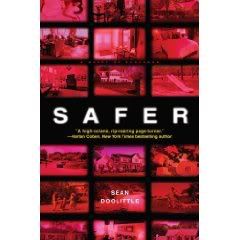Paul and Sara Callaway moved to the college town of Clark Falls, Iowa for Sara's job. On the night they move in, Sara is attacked while Paul runs an errand, which leads to a relationship with their neighbor, Roger Mallory. Roger is head of the neighborhood watch and an organization called Safety First, which advises people on personal safety. Roger is a Clark Falls icon. Paul never trusts Roger's gung-ho mentality and finds his "concern" intrusive, but he's shocked when he finds out just how twisted the neighborhood leader really is, especially when Paul is falsely accused of sexual misconduct with a 13-year-old neighbor. To save himself, Paul must dig deep into his idyllic neighborhood's dark past, and escape the clutches of those who would kill to protect it. Once again, Sean Doolittle stands apart from the pack. Though not the first time I've come across this plot, it hasn't been done to death, and it is done with some nice twists here. Some of the secondary characters really shine, like TV news reporter Maya Lamb and Paul's shark of an attorney, Douglas Bennett. It takes a little while to lay the groundwork and get the story moving, but once it takes off, it clips along at a brisk pace. Though not quite as original and fun as Doolittle's first novel, Dirt, this is a well-crafted piece with a more grown-up feel. These characters are middle-aged professionals, not the slackers I met in his debut. Sean Doolittle is comfortably finding his niche as an author, and while the critics gush about him a bit to excess, he is a quality suspense novelist who delivers compelling novels outside the polite, normal bounds, without crossing into the macabre.
You may never consider buying property on a cul-de-sac after reading "Safer." Cul-de-sacs might have been developed to slow traffic and generate residential peace and quiet, but the tension in "Safer" suggests they are an incubator for suspicion and crime. The strength of "Safer" lies in the sure-handed voice of the narrator, Paul Callaway, and the way this nifty thriller is constructed. The writing crackles throughout--but it's not over-the-top, it's grounded. The narrator is a college English professor in a bristling, difficult relationship with one particularly strange neighbor. The English professor is no prince and he digs his own holes, but as a reader I trusted what was being relayed--and the order of the events as they unfolded--because of his solid voice. The professor even schools us. "Class, do you see what I'm doing here? Observe these techniques: I begin with a brief anecdote about my father. As far as anyone knows, the anecdote might not even be true. But I've salted it with believable, blue-collar detail, and there's probably no way to judge its authenticity for sure. It doesn't really matter what my father actually said or didn't say. My intent is to establish tone and perspective. My own reliability as narrator. The tone is meant to be down-to-earth; the perspective is meant to be that of regular Joe. The kind of Joe with thinks of his father's advice. Did you notice that I named my father Joe?" A few moments like that one, where the narrator is essentially turning to talk directly to the camera, the action frozen for the moment behind him, give "Safer" a memorable style. Sprinkled here and there with references to William Faulkner and Raymond Carver, the writing is smart, witty and fresh. One or two characters (like the drunk lawyer at the beginning) were drawn from cliché and Callaway seemed to have it too easy when it came to canceling his classes to pursue his investigation. The old "I'll pretend to be a reporter" trick left me flat. These are minor quibbles. I felt completely drawn into the story--again, based on the strength of the main character. But the tension builds and the ending stirs up a rich brew of trouble and well-motivated bad guys. I could imagine a nifty movie of this story quite readily, complete with narration.


